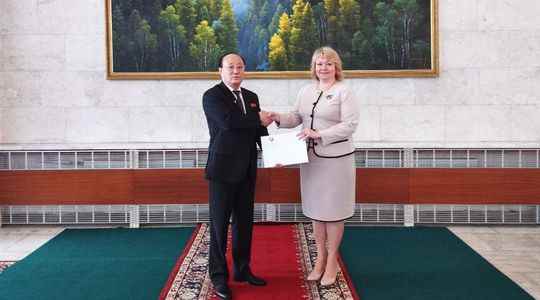Olga Makeyeva could not contain her joy. It’s not every day that this Moscow-based ambassador receives what she considers to be one of her colleagues. So on the red carpet, when immortalizing the ceremonial handshake, she smiled. His guest, the North Korean ambassador, did much more than visit him on July 13. He also gave him a letter recognizing the independence of his country, the “Donetsk People’s Republic”.
Last week, North Korea thus recognized the independence of the two “People’s Republics of Donetsk and Lugansk”, Ukrainian regions claimed by pro-Russian separatists. A visit from an ambassador, a photo and the promise of “state” treatment. Apart from Russia and Syria, no other state has done so. Ukraine denounced an attempt to “undermine the sovereignty and territorial integrity” of its country.
Better still: at the beginning of the week, the Russian ambassador to Korea proposed sending “Korean workers” to Ukraine, and more particularly to the Donbass, to participate in the “reconstruction” of this region that was pounded and largely controlled by the Russian army.
Two acts in the style of North Korean diplomacy
What is Pyongyang playing with such positions? These two acts fit “in the style of North Korean diplomacy, which tries to preserve or assert its political autonomy”, according to Pierre Rigoulot, political scientist and essayist, specialist in North Korea. “This involvement in the war in Ukraine is both a frontal opposition to the United States and to the West”, in line with its numerous missile launches and its nuclear tests. It is also a question of conveying “a message intended for Russia and China”, sums up the historian.
From the start of the war in Ukraine, Pyongyang had already affirmed its support for Russia, by voting against the UN resolution demanding “that Russia immediately cease the use of force against Ukraine”, on March 2, 2022 A month later, North Korea explained that the United States and its president, Joe Biden, a “senile old man”, were at the “root” of the conflict.
By getting a little more involved on the Russian side, North Korea is strengthening its anti-Americanism while doing a favor to an old ally. The Soviet Union was the first country to recognize not only the independence of the Kim dynasty regime, but also its sovereignty over the entire Korean peninsula, in 1948. During the Korean War (1950-1953), 26,000 soldiers from the USSR were sent to fight on the peninsula. In 2012, Russia also wrote off 90% of the North Korean debt it held.
A hushed competitive game
Since then, this support has persisted despite the isolation of Pyongyang. “Russian diplomacy has not abandoned North Korea. Russia is very present. It continues to send materials there that it has difficulty obtaining because of international sanctions, and employs seconded workers in its forests. in Siberia”, develops Pierre Rigoulot.
By supporting Moscow, which nevertheless voted for the UN sanctions imposed on it in 2006, 2009, and 2016, North Korea is returning the ball. Better: Pyongyang thus stands out from the position of China, which had, like Russia, vetoed the Security Council’s last proposal to increase sanctions after numerous missile launches in May 2022.
This other great ally of North Korea has not been so explicit about the separatists. But China did not go so far as to condemn the invasion of Ukraine. “North Korea seems to be reconnecting with its game of seesaw between the great communist powers. It relies on one, then on the other, and tries to impose a game of hushed competition” in order to strengthen its autonomy on the international scene, believes the political scientist. A strategy that Kim Jong-un did not invent. From the 1950s to the 1980s, Kim Il-sung had also tried to take advantage of the Sino-Soviet rivalry. With the success that we know.
